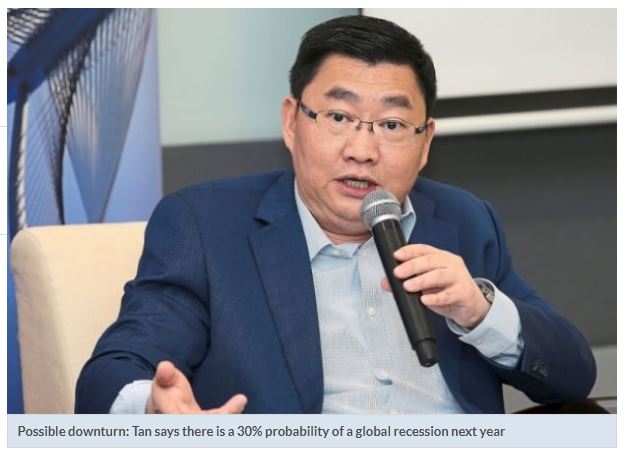Malaysia needs economic buffer
KUALA LUMPUR: Warning of the possibility of a global economic recession next year, Affin Hwang Capital said Malaysia needs to implement immediate measures to cushion against the impact.
The upcoming Budget 2020, its chief economist Alan Tan said, should be business-friendly and include short-term boosters to defend the country’s economy from external weaknesses.
During a media briefing yesterday, Tan said economists saw a 30% probability of a global recession in 2020, based on the assumption that US-China trade tensions will escalate into a full-blown trade war in the coming months.
This is in view of the possibility of the United States imposing tariffs on the remaining US$300bil of goods from China, and the latter eventually retaliating.
“We do not see a resolution to the trade war in the near future, and there is a strong possibility of the United States imposing a second round of tariffs,” he said.
Noting that the International Monetary Fund (IMF) is projecting a global growth of 3.6% in 2020 and the expectation that a full-blown trade war will drag the global economy down by 0.5 percentage points, he expects global growth to be at about 3.1% next year.
He said it was crucial that Budget 2020 included measures that not only supported private consumption but also strategises to drive investment.
The country, he said, needed to look at measures to promote investment such as introducing more tax incentives.
“The budget needs to help cushion the economy from external weaknesses,” he said, adding that one suggestion was to cut corporate tax rates.
Apart from this, he said, there needed to be an acceleration in infrastructure spending.
The government, he said, needs to step up development expenditure and stimulate the domestic economy.
He noted that this, however, could increase the federal government’s spending and make it challenging to achieve the targeted fiscal deficit of 3% in 2020.
“In times of uncertainty, there is a need to increase stimulus measures and provide the support to the domestic economy.
“From my perspective, if the fiscal deficit rises due to increased spending in development expenditure, sovereign rating agencies will maintain their stable outlook on Malaysia, given the external weaknesses,” he said.
This, he said, was as long as the fiscal deficit remained in the region of between 3.2% and 3.4% in 2020.
On another note, Tan said Malaysia could see capital inflows in line with the anticipated aggressive rate cuts by the US Federal Reserve, and with Bank Negara expected to maintain rates.
“The widening interest differential will see investors move money out from US-denominated assets into Asean assets.
“Malaysia will also be a recipient of capital inflows, although our interest differential is smaller compared to other countries in the region, like Indonesia,” he said.
Source: https://www.thestar.com.my/business/business-news/2019/07/24/msia-needs-economic-buffer/#vEQwvltRhYDDA3aX.99


 English
English




